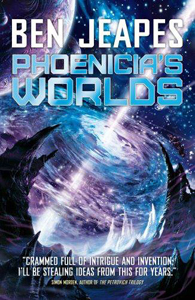 From Vector, no. 275, Spring 2014:
From Vector, no. 275, Spring 2014:
Phoenicia’s Worlds is the first adult novel from Ben Jeapes, whose reputation as a novelist rests on his young adult science fiction. I feel that young fans of his previous work will also find this book accessible, though there is enough depth here to interest the adult audience it is aimed at.
Phoenicia is the starship which brought the first colonists to the world of La Nueva Temporada, an ice-bound planet which is in the process of being terraformed. At the end of the voyage, a wormhole was opened to Earth and the starship, of no further use, was mothballed. Felipe Mateo and his brother Alex take over the ship with the intention of exploring further but the destruction of the wormhole means that the starship must be used to return to Earth and secure help for the now cut-off colony. As Felipe died in the disaster, Alex is the only person whom the ship – itself a character in the book – trusts to head this mission. At the same time that Alex departs, his half-brother, Quin, is born and, while time stops for Alex in the cryogenic sleep of the voyage, Quin grows to manhood in a world where resources dwindle and political troubles mount.
The thing that struck me most while reading this book is the contrasts it offers: the contrast between Nueva and Earth; between high technology and the bleak landscape of Nueva; most tellingly, between Alex and his half-brother Quin. While Alex remains young and retains a youthful idealism, Quin matures in a hostile environment and becomes corrupted. Jeapes traces in credible detail the way in which Quin’s good intentions are twisted by flaws in his character or balked by outside forces he cannot control.
The structure of the book also provides contrast in that Alex’s chapters are exciting space opera with fast action and conflict, while Quin’s chapters centre around political scheming. Jeapes is adept in switching from one to the other while leaving the reader in suspense.
The style is lively and readable with effective understated humour. (The sneaky chapter headings are fun, too!) The future technology is incorporated seamlessly into the story without any clunky infodumping. But the fact that it’s an easy read doesn’t mean that there’s no depth to it. I found myself thinking particularly about family and political relationships and about the morality of the choices which the characters make.
The one problem I have is with the ending of the book. There are two unexpected revelations in the final pages and I wish that Jeapes had prepared for them more carefully, in the manner of a whodunit writer seeding clues. As it stands, the ending seems rather rushed. However, this is a minor matter considering the book as a whole, which I thoroughly enjoyed.
– Reviewed by Cherith Baldry
